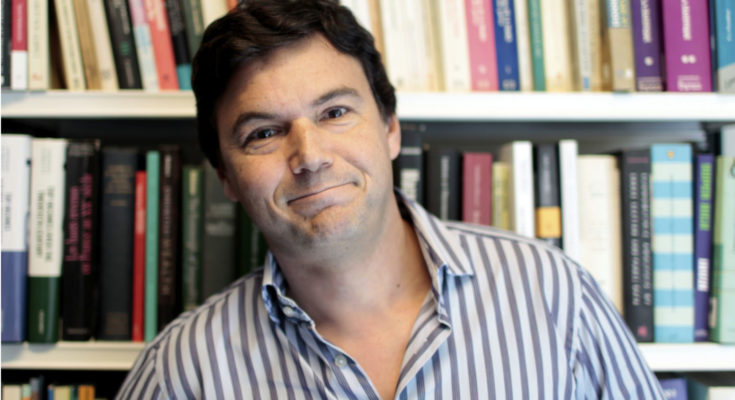‘We Don’t Have to Go All the Way to Socialism’
A recent book on wealth inequality by Thomas Pikkety, a left-leaning French economic historian, has just become an Amazon bestseller. In this interview, Pikkety allows that in his opinion, ‘we don’t have to go all the way to socialism‘ – well, what a relief. What he means is probably that we will have to at least go three quarters of the way, since we are obviously already half-way there.
Pikkety thinks ‘we need not only progressive taxation, but also a progressive tax on net wealth’. In other words, incomes are to be taxed not once, but twice (this actually happens already, there are after all capital gains taxes). This echoes the wealth confiscation scheme propagated by the IMF not too long ago, which is supposed to bail out the over-indebted governments of the euro area (see our previous article “Is a Large Wealth grab on the Way?†for details on this pernicious confiscation plan).

Thomas Pikkety: intellectual handmaiden to a wealth grab.
(Photo via sueddeutsche.de / Author unknown)
It is probably no coincidence that these ideas are so heavily promoted at the current juncture. Robert Shiller, the behaviorist who recently shared a Nobel Prize in economics with Eugene Fama for their respective work on financial markets, has also voiced the opinion that higher taxes are allegedly needed to ‘reduce inequality’ (as an aside, Shiller’s and Fama’s views about financial markets are diametrically opposed. In other words, at least one of them must be wrong. One wonders how the Nobel committee arrived at the decision to give its prize to both of them. It seems to make no sense. We actually believe both of them are wrong by the way).
Shiller recently published an editorial arguing in favor of taxing wealth in the New York Times (where else?), inter aliaquoting Pikkety’s views. Allegedly, we ‘need insurance against inequality’ and higher taxes are what will provide it:
“Professor Piketty talks about instituting a “global tax on capital†but acknowledges that it is a utopian idea and says that “it is hard to imagine the nations of the world agreeing on any such thing anytime soon.†He talks about raising the rate of the top tax brackets and raising inheritance taxes but sees “little reason for optimism†that this will happen. There have been big increases in taxes on the rich in the past, but he points out that these tax increases were put in place only in response to wars — specifically, World War I and World War II.
Let’s try not to have another major war. Instead, there are some positive things we can do now. As I said in my 2003 book, it would be wise to start amending the tax system immediately. I suggested this fundamental reform: Taxes should be indexed to income inequality so that they automatically become more progressive — meaning that the marginal tax rate for the highest-income people will rise — if income inequality becomes much worse. Ian Ayres of Yale and Aaron Edlin of the University of California, Berkeley, made a similar argument in 2011 in The New York Times.
There is a practical reason for starting now. If we wait until income inequality is much more severe, we will have a whole class of new superrich who will probably feel entitled to their wealth and will have the means to defend their interest. That’s already gone far enough. We shouldn’t let it become more extreme.
There is also a theoretical reason. It is what the psychologists Yaacov Trope of New York University and Nira Liberman of Tel Aviv University called temporal construal theory. They showed that people are more idealistic and generous when dealing hypothetically with the distant future than they are about actions they need to take today. That’s why it pays to ask people to decide on measures to uphold egalitarian ideals when they don’t have to cough up the money immediately.

